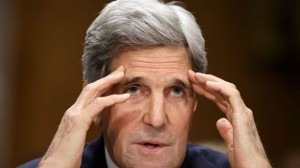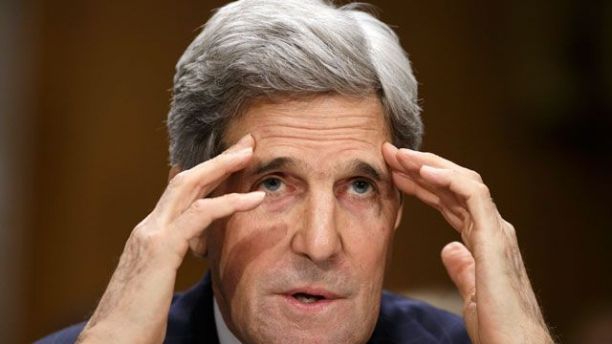 The Obama administration is facing mounting skepticism in Congress about the course of nuclear talks with Iran, as even America's top diplomat says he's "agnostic" on whether the highly touted talks can yield an agreement.
The Obama administration is facing mounting skepticism in Congress about the course of nuclear talks with Iran, as even America's top diplomat says he's "agnostic" on whether the highly touted talks can yield an agreement.The United States, other world powers and Iran currently are operating under an interim deal that rolled back sanctions in exchange for Iran reining in its nuclear operations.
But several developments have thrown the fragile peace into question. Facing lawmakers on Capitol Hill on Tuesday, Secretary of State John Kerry weathered a barrage of criticism about the status of this and other diplomatic campaigns.
"I must say, I think you're about to hit the trifecta," Sen. John McCain, R-Ariz., told his former Senate colleague, claiming that efforts to ease the fighting in Syria, bring the Israelis and Palestinians to the negotiating table and resolve the Iran nuclear issue are all facing defeat.
McCain pointedly said he believes the Iran talks "will collapse."
Kerry continued to hold out hope that ongoing nuclear talks in Vienna could bear fruit.
"The option is, you can go to war. A lot of people are ready to drop bombs all the time. ... But this president and this secretary of State believe that the United States of America has a responsibility first to exhaust every diplomatic possibility to find out whether we can prove what the Iranians say, that their program is peaceful," Kerry said.
At the same time, the secretary said he's not "predicting success" and remains "agnostic and questioning."
Kerry's State Department is trying to juggle an array of overseas flare-ups, not the least of which is Russia's takeover of the Crimean Peninsula, and concerns that Moscow could move deeper into Ukraine.
On this front, McCain accused Kerry of "talking strongly and carrying a very small stick, in fact, a twig."
Now, a separate development involving Russia is throwing a wrench into the Iran nuclear issue.
The Russian business daily Kommersant has reported Russia plans to buy 500,000 barrels of Iranian oil a day, shattering an export limit defined by the interim nuclear agreement world powers and Iran reached last year. The oil-for-goods exchange is still far from finalized, the newspaper said, but its potential challenges Western efforts to secure a comprehensive agreement.
Kerry on Tuesday told the Senate Foreign Relations Committee that the Obama administration has warned Iran and Russia about moving forward with the oil contract. It would violate the interim agreement reached in November in Geneva, he told the Senate panel, "and, yes, it could trigger U.S. sanctions."
However, America's top diplomat stopped short of saying a Russian-Iranian deal would automatically trigger U.S. economic penalties on Iran. The Obama administration has avoided giving a clear ultimatum because fresh U.S. sanctions on Iran would likely derail diplomatic efforts over its nuclear program.
Critics of the administration's outreach to Iran are seeking a clear marker.
In a letter to the president Monday, Congress' leading sanctions advocates said the U.S. must re-impose all penalties on Iran suspended under the interim pact if Moscow and Tehran move forward. "We urge you to put Iran on notice," said Sens. Bob Menendez, D-N.J., and Mark Kirk, R-Ill.
Tennessee Sen. Bob Corker, the Senate Foreign Relations Committee's top Republican, said the two countries were testing America's resolve. "The administration must be prepared to restore all sanctions if Iran cheats," he said.
In another diplomatic scuffle, Iran triggered outrage in the U.S. by picking as its new U.N. ambassador someone tied to the 1979 hostage crisis in which a Muslim student group held 52 Americans hostage for 444 days.
After the Senate voted to block the pick from entering the U.S., White House Press Secretary Jay Carney said Tuesday that the U.S. government has informed Iran "that this potential selection is not viable." It remains to be seen how or whether the dispute will affect the nuclear talks.
The U.S. and the United Nations have said Iran is living up to its commitments thus far, and officials have, despite the skepticism on the Hill, expressed belief a final deal may be taking shape, averting the possibility of a future military confrontation.
The current agreement expires in July, and officials have been scrambling to see a new one struck before that deadline.
Speaking with Fox News on Wednesday, Sen. Marco Rubio, R-Fla., cast doubt on the possibility of a breakthrough.
"Iran is closer today than they've ever been to being a nuclear weapons power. In fact, the U.S. has apparently agreed to allow them the capability to enrich," he said. Rubio ticked off a host of trouble spots around the world, and added, sarcastically: "Other than that, things are going well, I suppose."
By Fox News�
The Iran Project is not responsible for the content of quoted articles.











